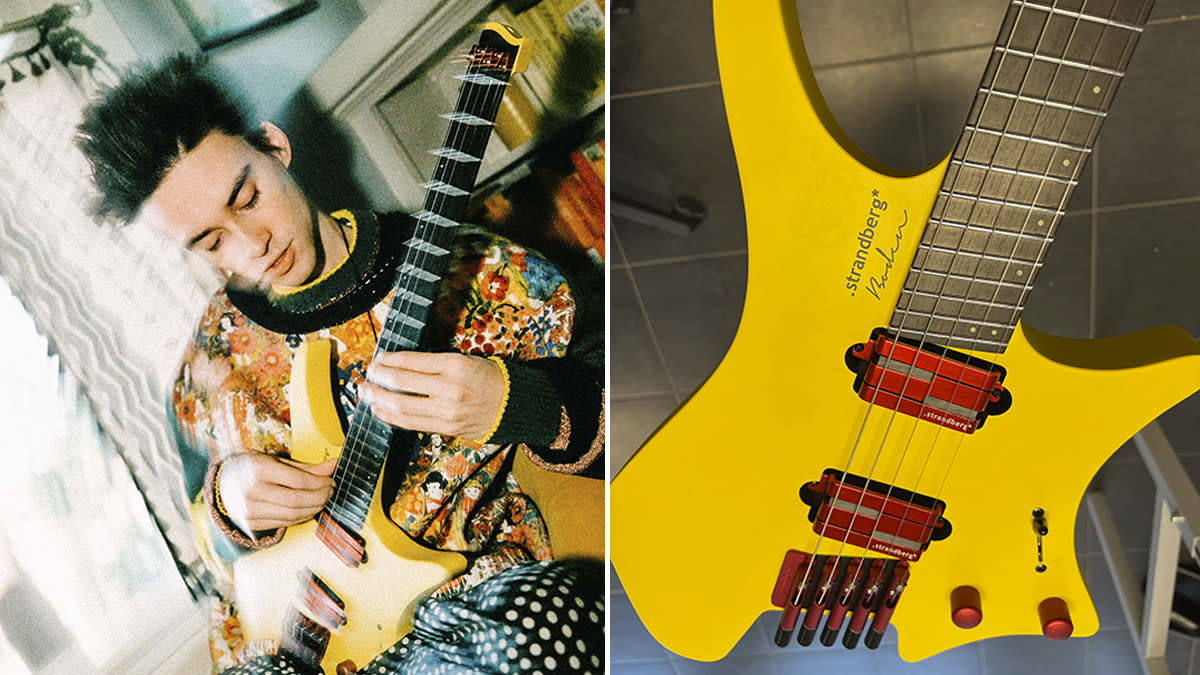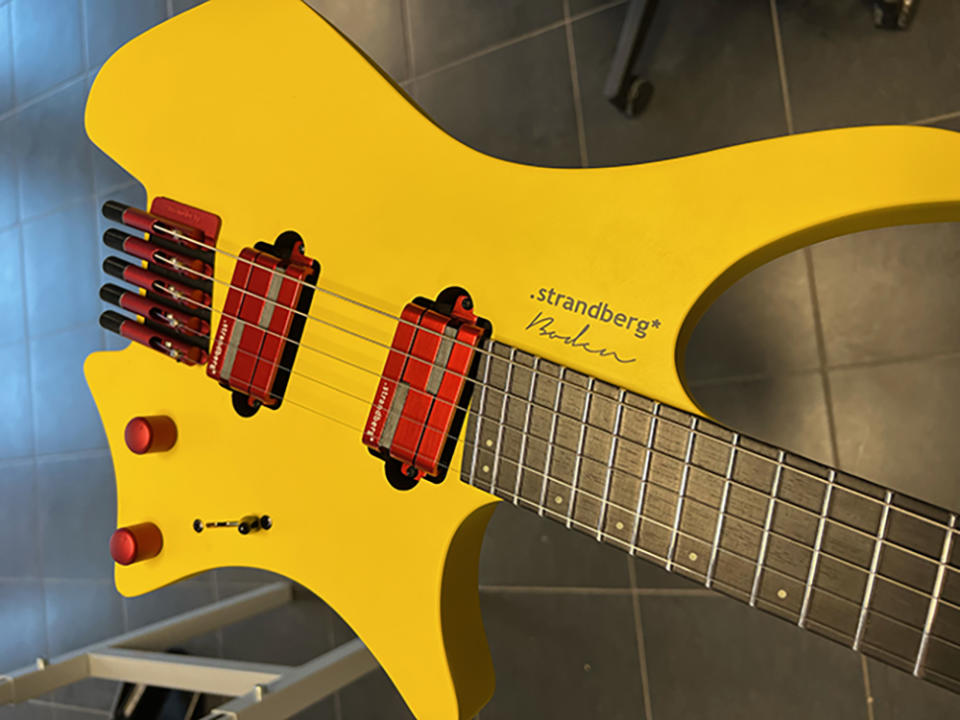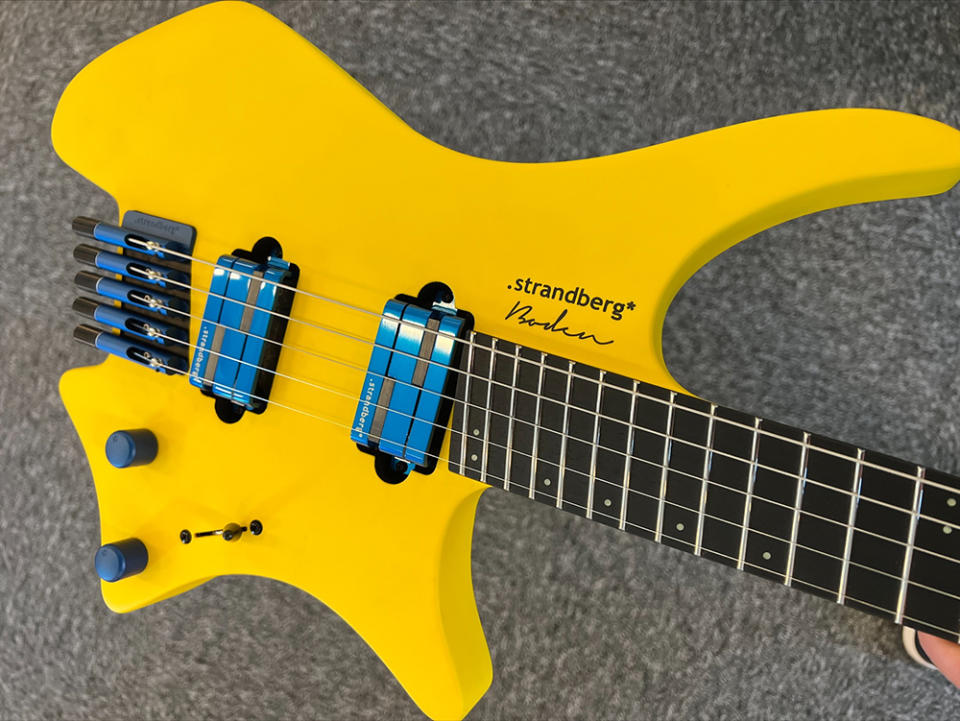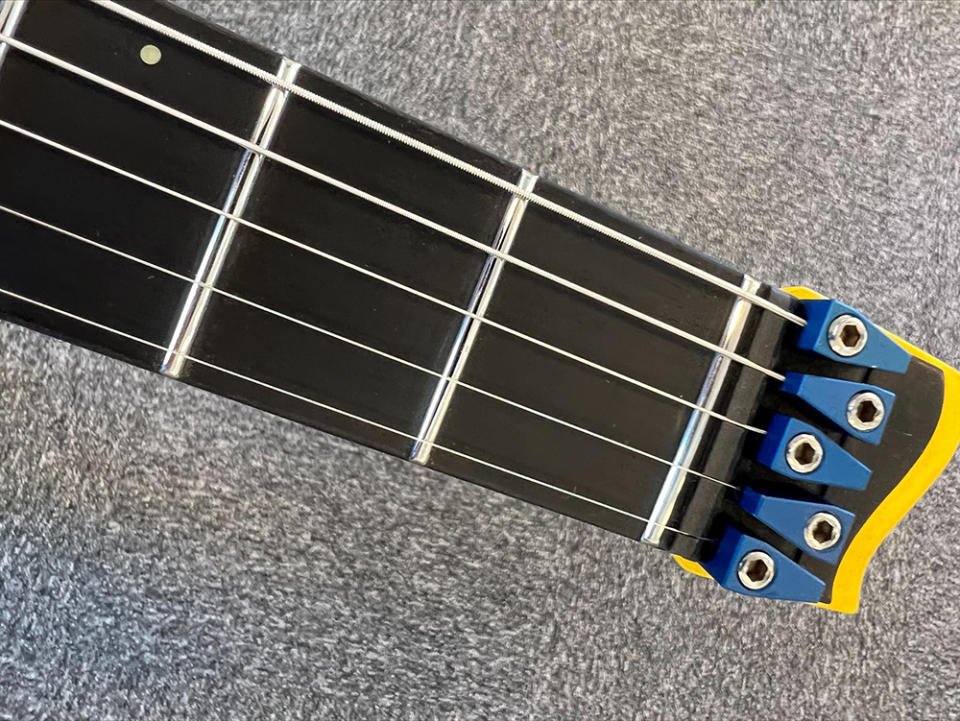“Everything about the design appeals to me”: Jacob Collier on why he created his wild 5-string Strandberg – and how he unlocked a new musical language with its unusual alternate tuning

Jacob Collier has been keenly teasing his upcoming album on social media, and those with an interest in the multi-instrumentalist’s electric guitar activities were especially intrigued when it was confirmed both Steve Vai and Willow would feature on the record.
Furthermore, the presence of a wild five-string Strandberg model in ensuing posts gave rise to speculation that Collier would dip his toes into more progressive guitar waters for Djesse Vol. 4 – theories that were confirmed with the release of his recent rock-leaning single, WELLLL.
Co-written with Remi Wolf and teeming with full-throttle guitar action, WELLLL is perhaps the rockiest song in Collier’s repertoire to date, with the music video giving fans a closer look at his elusive headless instrument.
But this guitar is more than just a figurehead for Collier’s rock-informed turn – instead, it’s the result of a new partnership between Collier and Strandberg, and the product of an experimental alternate tuning that once helped Jacob unlock a new musical language.
We spoke to both Jacob Collier and Ola Strandberg to find out how one of 2023’s most intriguing custom builds came to be.
As the adage goes, ‘less is more’, and that's a mantra Collier holds close to his heart: he's no stranger to streamlined models – he does have a five-string Taylor acoustic guitar, after all – and as he explains to Guitar World, his first guitar was a four-string tuned in fifths.
The concept for Collier’s five-string guitar, however, was born out of two very different instruments: a radical True Temperament and expanded eight-string Strandberg.
As brand founder Ola Strandberg tells us, Collier first crossed paths with a Strandberg while working with metal outfit Arch Echo in 2021, during which time he played Adam Rafowitz’s seven-string model. From that point, he was intrigued.
“Adam made the introductions, and the conversation started that way,” Strandberg tells us of his collaboration with Collier. “We did our best to impress with a custom-painted guitar much in line with what I imagined Jacob would get up on stage with.”

However, it wasn’t until the multi-instrumentalist virtuoso played in Stockholm that the pair could finally meet up, and discussions for a Collier custom could commence.
“I felt that if there is any musician on the planet that could make use of perfect intonation, or use extended-range guitars in a creative way, it would be Jacob,” Strandberg recalls. “So, I brought a True Temperament guitar, and a selection of six-, seven-, and eight-strings for him to try out.”
That meeting ended with Collier holding on to the eight-string, True Temperament and custom-painted models, the latter of which made an appearance later that evening during Collier’s set.
“Everything about the Strandberg design appeals to me,” Collier explains to us. “Not only are they visually stunning, unique and slick, they are also lightweight, supple and feel incredible under the fingers.”
But even before Collier took to the stage with his flashy headless model, the seed had been sown for his very own Strandberg – one that would take cues from his five-string Taylor and flip his new True Temperament model on its head.
“Jacob took us on a tour of the stage and his setup, and showed us his custom-made Taylor acoustic five-string, which he is very fond of,” Strandberg goes on. “He was curious to know whether it would be remotely possible to make a five-string Strandberg.”
As mentioned above, Collier was an avid fan of utilizing fewer strings long before he crossed paths with Strandberg, and his desire for a five-string electric guitar stemmed from his first-ever four-string.
Fans of Collier’s work will be familiar with his meticulous and virtuosic approach to harmonies and arrangement, so it will come as no surprise to learn that a similar philosophy was transferred to his early explorations of the guitar.
It’s this inquisitive mind that helped Collier formulate his preferred D A E A D alternate tuning – a strangely symmetrical setup divided into 4ths and 5ths that helps him “cover more ground with fewer strings to cross”.

“The first guitar I ever owned and fell in love with was a four-string Tenor guitar tuned in fifths like a mandolin one octave lower – G D A E ascending,” he explains. “The feeling of this under my fingers became a deeply strong magnet for my music world.
“It really clicked when I tuned the highest string down a tone to a D (G D A D) as it unlocked some of my 4ths-based language that was native to me as a bass player before that.”
But the setup wasn't finished there. Instead, a lower fifth string (alongside a retune of the fourth and third strings) was added by Collier, who “craved” a bit more range in the bottom end and a sense of symmetry between the upper and lower strings: “Thus, the design for the D A E A D guitar emerged in my imagination.”

With a newfound affinity for Strandberg, this favored five-string tuning in mind, and Ola onboard for the build, the creation of Collier’s custom guitar could begin.
Strandberg says it was a “challenge”, but the five-string experiment was more straightforward than it looks. Helpfully, modular hardware was part of the design brief that Ola set way back when the brand was still “just a self-funded hobby”.
This meant that key components to accommodate “any number of strings laid out in any relationship in a multiscale guitar” were already at his disposal. As Strandberg notes, “it was one of the perfect opportunities to showcase one of the capabilities” of his design.

The result was not one, but two fully fledged five-string Strandbergs based on the brand’s Boden Metal template, complete with Lace Sensor Alumitone pickups, a patented EndurNeck profile, a 25.5”-25” multi-scale length and 24 stainless steel frets.
Aside from the different color hardware – one has red, the other has blue – both models are the same. According to Ola, Collier keeps one in Europe and the other in the US.
Collier, understandably, was thrilled with the end product and its recruitment of the D A E A D tuning, which encourages him to explore a “mixture of drone-related lower voicing segments, and more 'quartal' upper structure, which I really enjoy within my personal harmonic apparatus”.

And, not only does it sound good, it’s just as payable as any other Strandberg, thanks to its ergonomics: “The range is the same as a six-string guitar, but the tuning differentiation gives me a ton of fresh ideas, and enables me to cover more ground with fewer strings to cross,” Collier notes.
D A E A D tuning gives me a ton of fresh ideas, and enables me to cover more ground with fewer strings to cross
“My five-string Strandberg uses the width of a six-string neck, which means there is slightly more breathing room around each string, which I love,” he goes on. “The neck is incredibly ergonomic, and the controls are super-intuitive – even to a slight electric guitar novice like me!
“I have loved every moment noodling around and jamming out on festival stages over the last couple of months. Most importantly – they just sound undefeated.”
The fourth and final instalment of Collier's Djesse album project is on its way, and that means even more soundbites of the Strandberg are in the pipeline – and, if WELLLL is anything to go, Collier truly plans to make the most out of his flashy new custom guitar.
Head over to Jacob Collier's Instagram and website for future updates on his ongoing tour and Djesse Vol. 4.
